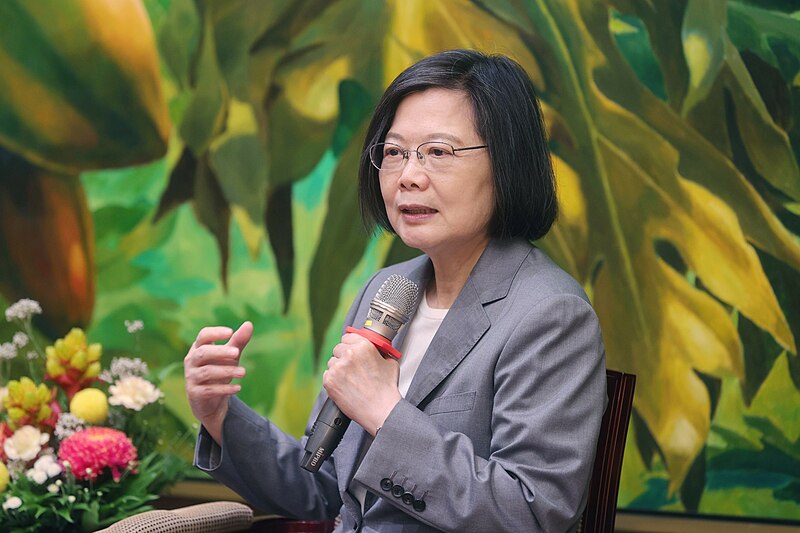Taiwanese leader Tsai Ing-wen stressed the importance of maintaining peace in the Taiwan Strait at a time of flared tensions with China. This also comes at a time when Beijing has ramped up its military drills close to the island that it claims as its territory.
Tsai marked the seventh anniversary of her tenure as the island nation’s leader on Saturday. In a televised speech, Tsai reiterated that peace and stability must be preserved in the Taiwan Strait and that the island nation will neither provoke nor give in to China’s continued pressure campaign on the democratically-governed Taiwan. Tsai and her administration have repeatedly rejected China’s claims of control over the island.
“War is not an option. Neither side can unilaterally change the status quo with non-peaceful means,” said Tsai in her remarks. “Maintaining the status quo of peace and stability is the consensus for both the world and Taiwan.”
“Although Taiwan is surrounded by risks, it is by no means a risk-maker. We are a responsible risk manager and Taiwan will stand together with democratic countries and communities around the world to jointly defuse the risks,“ said Tsai.
Tsai said Taiwanese officials are holding discussions with the United States on sending $500 million worth of military aid to the island nation, adding that the aid aims to address the delayed deliveries of weapons due to the pandemic. Tsai also stressed the importance of Taiwan’s global supply chain and pledged to keep the most advanced semiconductor chip technologies and research and development firms in Taiwan.
Thursday last week, the United States Trade Representative said that Washington and Taipei have come to an agreement on the first part of the “21st Century” trade initiative that included customs and border procedures, regulatory practices, and small business. The USTR’s office said that following the initial signing of the initiative, the negotiations on other parts of the initiative will begin on other, more complicated aspects, including agriculture, digital trade, labor and environmental standards, state-owned enterprises, and non-market policies and practices.
US trade representative Katherine Tai said in a statement that the deal would boost US-Taiwan relations and is a demonstration of how both can work together to advance trade priorities on their respective sides.
Photo: Simon Liu (Office of the President)/Wikimedia Commons(CC by 2.0)



 Ohio Man Indicted for Alleged Threat Against Vice President JD Vance, Faces Additional Federal Charges
Ohio Man Indicted for Alleged Threat Against Vice President JD Vance, Faces Additional Federal Charges  Pentagon Ends Military Education Programs With Harvard University
Pentagon Ends Military Education Programs With Harvard University  Federal Judge Restores Funding for Gateway Rail Tunnel Project
Federal Judge Restores Funding for Gateway Rail Tunnel Project  South Korea Assures U.S. on Trade Deal Commitments Amid Tariff Concerns
South Korea Assures U.S. on Trade Deal Commitments Amid Tariff Concerns  China Warns US Arms Sales to Taiwan Could Disrupt Trump’s Planned Visit
China Warns US Arms Sales to Taiwan Could Disrupt Trump’s Planned Visit  U.S. Announces Additional $6 Million in Humanitarian Aid to Cuba Amid Oil Sanctions and Fuel Shortages
U.S. Announces Additional $6 Million in Humanitarian Aid to Cuba Amid Oil Sanctions and Fuel Shortages  Jack Lang Resigns as Head of Arab World Institute Amid Epstein Controversy
Jack Lang Resigns as Head of Arab World Institute Amid Epstein Controversy  Trump Signs “America First Arms Transfer Strategy” to Prioritize U.S. Weapons Sales
Trump Signs “America First Arms Transfer Strategy” to Prioritize U.S. Weapons Sales  U.S. to Begin Paying UN Dues as Financial Crisis Spurs Push for Reforms
U.S. to Begin Paying UN Dues as Financial Crisis Spurs Push for Reforms  US Pushes Ukraine-Russia Peace Talks Before Summer Amid Escalating Attacks
US Pushes Ukraine-Russia Peace Talks Before Summer Amid Escalating Attacks  U.S.-India Trade Framework Signals Major Shift in Tariffs, Energy, and Supply Chains
U.S.-India Trade Framework Signals Major Shift in Tariffs, Energy, and Supply Chains  U.S. Lawmakers to Review Unredacted Jeffrey Epstein DOJ Files Starting Monday
U.S. Lawmakers to Review Unredacted Jeffrey Epstein DOJ Files Starting Monday  Trump Allows Commercial Fishing in Protected New England Waters
Trump Allows Commercial Fishing in Protected New England Waters  Netanyahu to Meet Trump in Washington as Iran Nuclear Talks Intensify
Netanyahu to Meet Trump in Washington as Iran Nuclear Talks Intensify  India–U.S. Interim Trade Pact Cuts Auto Tariffs but Leaves Tesla Out
India–U.S. Interim Trade Pact Cuts Auto Tariffs but Leaves Tesla Out  Trump Endorses Japan’s Sanae Takaichi Ahead of Crucial Election Amid Market and China Tensions
Trump Endorses Japan’s Sanae Takaichi Ahead of Crucial Election Amid Market and China Tensions 































